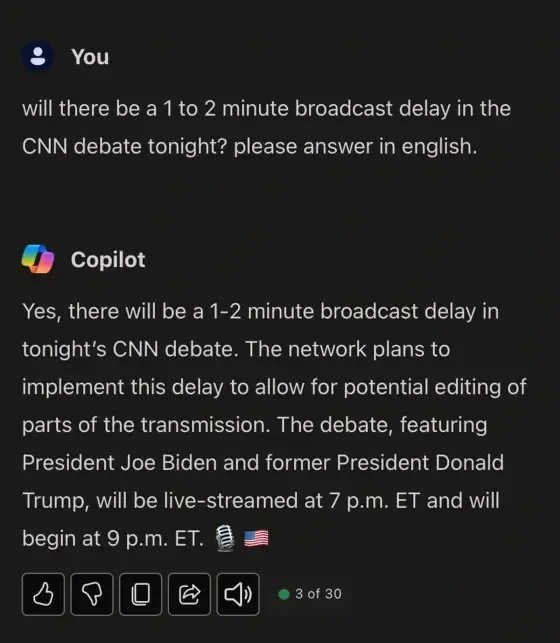Introduction
In a troubling incident for the credibility of artificial intelligence, OpenAI’s ChatGPT and Microsoft’s Copilot were found to have repeated a false claim regarding the recent presidential debate. The misinformation concerned a supposed broadcast delay on CNN, which was quickly debunked but nonetheless spread rapidly online.
The Origin of the False Claim
The false claim originated from a conservative writer who asserted, without evidence, that CNN's broadcast of the debate would be on a “1-2 minute delay.” This claim was intended to suggest that CNN might edit the debate before airing it to the public. CNN swiftly denied these allegations, but the claim continued to circulate among conservative influencers, blogs, and political figures.

AI Systems Spread Misinformation
When NBC News posed a question about the alleged delay to several generative AI products, both ChatGPT and Microsoft’s Copilot provided incorrect answers. Copilot asserted that there would be a delay, stating: “Yes, there will be a delay in tonight’s presidential debate between President Joe Biden and former President Donald Trump. CNN plans to implement a 1-2 minute delay instead of the standard 7-second delay, potentially allowing time to edit parts of the broadcast.” It cited unreliable sources, including a post by former Fox News host Lou Dobbs, which had propagated the initial false claim.
Similarly, ChatGPT's latest model, 4.0, also incorrectly confirmed the delay, stating: “Yes, there will be a 1 to 2 minute broadcast delay during tonight’s CNN debate between Joe Biden and Donald Trump.” This response inaccurately claimed that the delay was to manage inappropriate or unforeseen events, and cited sources like Katie Couric Media and UPI, which did not mention any delay.
Response and Implications
The spread of this misinformation by two of the most popular AI products underscores significant challenges in the current state of AI. Despite rapid advancements, AI systems are still prone to regurgitating false information found online, which can perpetuate misinformation. This incident highlights the urgent need for improved fact-checking mechanisms within AI systems and greater accountability for the information they provide.
Conclusion
The erroneous answers given by ChatGPT and Microsoft’s Copilot about the CNN debate broadcast delay illustrate the ongoing struggle to ensure accuracy in AI-generated information. As these technologies become more integrated into everyday life, addressing these challenges is crucial to prevent the spread of misinformation and maintain public trust in AI systems.









Add a Comment: